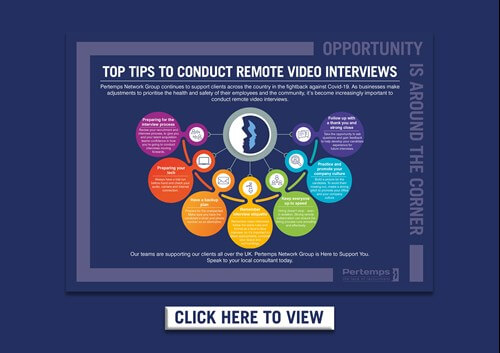Here at Pertemps, we like to take as much pressure off managers as possible. We pre-screen candidates, provide plenty of background details and highlight key qualities of the individual that’s been put forward for interview.
However, what we don’t do, is sit inside the interview room itself: we leave that task to the client. They know their business better than anyone else.
Having said that, even the most skilled and experienced manager can make the odd slip-up when it comes to interviewing a candidate. So, here’s a few pointers that are worth following, particularly if you have recently been appointed to a senior position and are interviewing a candidate for the first time.

Research the candidate
You’d be disappointed if a candidate was unable to answer any questions about your business, right? You expect them to do a little bit of homework about the company they’re applying to work for. Well, the same is true of managers. Make sure you read about the individual beforehand, check the finer details of their CV and covering letters. View their social media pages, particularly LinkedIn. Understand who it is that’s coming for interview and prepare questions that are suitable. You should already be starting to build up a picture of the candidate long before they’re sat before you face-to-face.
Get the room ready
It may seem obvious but you’d be surprised at how many managers do actually forget to book an interview room in advance. Remember, this is just as much about you selling the business to the candidate as it is them looking to be hired. Searching for an available room with the candidate in tow is not a good look. Neither is clearing the desk of paperwork as they’re stood waiting to sit down. Get everything in order long before they’ve arrived. Make them welcome with the offer of a drink. Make them feel relaxed.
Sing from the same hymn sheet
Some managers prefer to conduct interviews alone but it may be advisable to have another key colleague in the room to gauge a second opinion. If you’re intending to let others join you, make sure they are prepped and seeking the same end-goal. Last thing anyone wants is for two or three people to be rambling off at a tangent or asking the same questions you just asked. This will only confuse the candidate and possibly send out the message that there is a distinct lack of communication within the business.
Keep your focus
You’ll often come across candidates that you know from the off will, for whatever reason, simply not cut it at your business. This doesn’t mean they are useless or incapable. They maybe just don’t fit with your company ethos. This doesn’t give you the right to switch off and ruin the candidate’s self-esteem or confidence. Remain interested, listen to what they are saying and provide constructive comments. Avoid sitting there reading paperwork or making notes when you should be giving them eye-contact. Drumming your fingertips on the table suggests they are starting to annoy you – again, this isn’t the impression that you want to give of your company. Remember what your parents used to tell you: manners cost nothing!
Body language
Following on from the above point, you should always retain a professional stance regardless of the interviewee and their suitability for the role. Slouching in the chair doesn’t look good, and tapping your feet with your legs crossed may look as if your mind is elsewhere. Sit up straight, retain eye contact and look authoritative.
Ask the right questions
Again; this seems obvious, but make sure that the questions you ask relate to the actual job itself. You are trying to find out if they have the competencies to complete certain tasks so ask them! Have they done it before? Was it a success? How did they overcome problems? Can they detail specific examples which prove all of these points? Avoid clichés such as ‘where do you see yourself in five year’s time?’ The candidate is likely to tell you what you want to hear, but what does this really reveal about them? Delve deeper and get to know the real them: are they the right fit for your team and this particular role?
Get over your own biases
You may always wear a suit and tie for work but that doesn’t mean other companies have the same dress code. So, if a candidate turns up to interview without a tie, don’t suddenly write them off. The person could easily have come from another job where the dress code is casual. Likewise, if you spot a gap in their CV where they didn’t study or work, don’t jump to conclusions, there may be a valid explanation. And just because you’ve discovered loads of photos of them out drinking with friends on social media, doesn’t mean they are always out on the lash and unfit for work! Remember, you can’t judge a book by its cover. It’s your job as a manager to ask the right questions and get the full story.
For an in-depth analysis of the UK's labour market, take a look at the latest CBI/Pertemps Employment Trends Survey.


